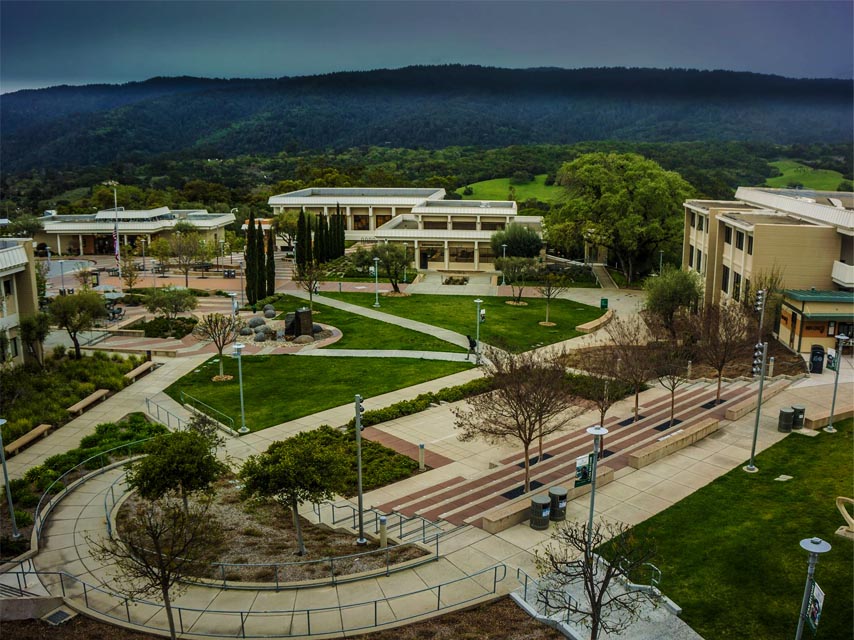Two Peninsula legislators are proposing a study to establish a California State University, Silicon Valley, at Cañada College in Redwood City. If ultimately approved, it would be the first community college in the state to become a four-year state college.
State Senator Jerry Hill, D-San Mateo, and Assemblyman Kevin Mullin, D-South San Francisco, have written to the Senate Budget committee and subcommittee chairs asking for $1 million “for an independent feasibility study and plan for the creation and successful implementation of a permanent CSU, Silicon Valley” at Cañada.
The letter notes that the county has no public four-year university, leaving students to transfer to San Francisco State University, San Jose State University or CSU East Bay.
“Though geographically close in proximity, the realities of severe transportation congestion and increased housing scarcity and insecurity … particularly on the Peninsula … make accessing these universities difficult for many students and for many others simply impossible,” the letter states.
Community College Board President Maurice Goodman described traffic, housing challenges and the cost of living as “barriers” that have prevented students from transferring and attending the nearest four-year state universities.
“I’ve seen students get accepted to San Jose State or CSU East Bay who couldn’t go,” Goodman said. “The cost of housing and transportation is almost like going to college around the state or out of state.”
Said Hill: “The congestion and the cost of commuting have made San Francisco State and San Jose State unviable options.”
Fifteen of California’s community colleges offer officially sanctioned four-year degree programs, including Skyline College, where a student can obtain a Bachelor of Science degree in Respiratory Care in cooperation with San Francisco State. Cañada offers four-year Bachelor’s degrees in Human Services, Business Administration and Arts in Psychology. But those degrees are awarded by Notre Dame de Namur University in Belmont. Cañada provides the facilities. Other degrees were offered at Cañada stating in 2002, but funding cuts forced the program to close in 2008.
Hill called the Cañada campus “a perfect location and perfect campus,” a sentiment echoed by Goodman, who said the campus can accommodate the growth in student population that would come with a four-year college.
“The state of our facilities is excellent, it’s a beautiful campus with land to build on in the heart of Silicon Valley,” Goodman.
The legislators and Goodman noted that a CSU at Canada would save the state the cost of building a new CSU campus, estimated in the hundreds of millions of dollars.
Hill said he thought a CSU campus at Cañada could mean an estimated 5,000 students at the Redwood City campus, which currently has an enrollment of about 7,000, according to the most recent data.
A data sheet included with the Hill-Mullin letter “confirms that thousands of students are graduating from community colleges throughout the Peninsula with nowhere to go.”
From 2012-2018, 13,490 students earned degrees or professional certificates from the districts three colleges, but 7,112, or 52.7 percent, did not go on to enroll at a four-year institutions, according to the data. Those students who did not continue on to college and a four-year degree “were more likely to be members of marginalized and underserved communities of color, with 1 in 3 also being first-generation students,” the data sheet reports.
“There is an unmet need for public, four-year university education in San Mateo County,” the letter concludes.
Hill said if CSU, Silicon Valley, ultimately is approved, it would take three to five years for the new university to be up and running.
He said he is optimistic that the proposal will be welcomed by the Senate and Gov. Gavin Newsom. “This is the kind of innovative, out of the box thinking that is typical of this governor,” Hill said.
To see the letter sent by Hill and Mullin and associated data sheets, see below.
Contact Mark Simon at mark.simon24@yahoo.com.
*The opinions expressed in this column are the author’s own and do not necessarily reflect the views of Climate Online.
Photo credit: Cañada College
![]()
![]()
![]()
![]()






